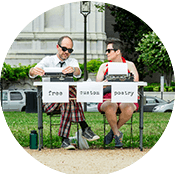- April 26, 2016
- By Natalie Koltun
To one person, a drawing of a half-circle represents a hamburger bun. To another, it’s a smile. Or perhaps it’s a toupee. Frankie Abralind MBA ’12 saw the potential for a game.
 The serial entrepreneur and self-described “design thinking consultant” is the brains behind BrainSpin, a creative icebreaking card game—for parties, corporate events and awkward first days of school. The game, sold by a subsidiary of Hasbro, was released at the New York Toy Fair in February.
The serial entrepreneur and self-described “design thinking consultant” is the brains behind BrainSpin, a creative icebreaking card game—for parties, corporate events and awkward first days of school. The game, sold by a subsidiary of Hasbro, was released at the New York Toy Fair in February.
In other words, Abralind has managed to turn cloud watching, or the Rorschach inkblot test, into one of several successful ventures.
“A huge part of the game, and my job, is listening to people’s perspectives and understanding what’s going on inside their heads,” says Abralind, who also teaches in UMD’s Academy for Innovation and Entrepreneurship.
With a mixture of earnestness and enthusiasm, he uses the concept behind BrainSpin in his lectures to teach students the importance of collaboration and ingenuity when dealing with limited resources.
“Someone might look at a product and see just one use, but when you get a group of people together who each see the same product in a different way, well, now you’re in business,” he says.
 Unconventional thinking isn’t just his job. It infuses his side gig as a street poet. On dozens of occasions over the past three years, he’s carted a fold-up table, a simple typewriter and clipboard to the National Mall, then posted a sign: Free Custom Poetry. Abralind draws curious passersby for a “brief yet personal” chat, after which he whips up a personalized poem in the style of Dr. Seuss, e.e. Cummings or Allen Ginsberg. He’s written hundreds of haikus, limericks and sonnets on the spot.
Unconventional thinking isn’t just his job. It infuses his side gig as a street poet. On dozens of occasions over the past three years, he’s carted a fold-up table, a simple typewriter and clipboard to the National Mall, then posted a sign: Free Custom Poetry. Abralind draws curious passersby for a “brief yet personal” chat, after which he whips up a personalized poem in the style of Dr. Seuss, e.e. Cummings or Allen Ginsberg. He’s written hundreds of haikus, limericks and sonnets on the spot.
“Even if they didn’t get a poem in the end, most of them seem to be moved by the fact that someone cared about them and made them feel special for just a few minutes of their day,” he says.
To keep things fresh, he’s had a diverse assortment of jobs, not to mention a yearlong sabbatical in France. The Virginia native graduated from Cornell University with a degree in design and interior architecture and worked for an eco-focused political nonprofit, where he specialized in renewable fuel sources. He went on to design, build and operate what was once Maryland’s largest biodiesel plant. There, Abralind launched biodieselSMARTER, a magazine for small-scale fuel producers.
He later did marketing for a heavy machinery company in Delaware before returning to Washington, D.C., to found the consulting firm HTA Design Thinking. Abralind also teaches his trade at workshops like Design Thinking: DC, DC Day of Learning and DC Service Jam. One lesson he weaves into the workshops is how to approach conversations in a more conducive way through open-ended questions and an open mind.
“We don’t realize how trained we are to ask leading questions when we hope to find a certain bit of information, and almost everything we say and ask surrounds that bit of hope,” says Adrian Mangiuca, an attendee of Abralind’s workshops and a BrainSpin play-tester. “Frankie comes into conversations with no baggage, and what’s special is that he treats every opportunity to speak with someone as a way to learn.”
He came up with the game as a student at Cornell, where one day he made a list of what the doodles trimming the margins of his notebook might depict. Two years later, he drew simple sketches on a stack of index cards and persuaded his friends to test-run the game at a party. They produced vastly different interpretations of the same shape and earned a point for each unique description, Boggle-style.
Abralind took the idea for BrainSpin off the shelf, where it sat since 2003, and exhibited it at the 2014 Chicago Toy & Game Conference, where it was a hit, selling 100 copies to fellow game connoisseurs (more than any other inventor there). It also caught the eye of a Hasbro representative from Winning Moves Games, and today, it’s sold on Amazon and in hundreds of toy stores across North America.
